英语一般过去时用法详解
- 格式:doc
- 大小:68.00 KB
- 文档页数:9
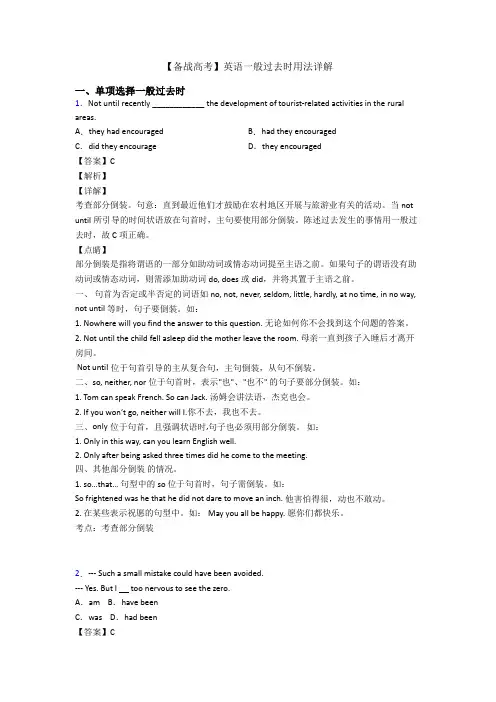
【备战高考】英语一般过去时用法详解一、单项选择一般过去时1.Not until recently ____________ the development of tourist-related activities in the rural areas.A.they had encouraged B.had they encouragedC.did they encourage D.they encouraged【答案】C【解析】【详解】考查部分倒装。
句意:直到最近他们才鼓励在农村地区开展与旅游业有关的活动。
当not until所引导的时间状语放在句首时,主句要使用部分倒装。
陈述过去发生的事情用一般过去时,故C项正确。
【点睛】部分倒装是指将谓语的一部分如助动词或情态动词提至主语之前。
如果句子的谓语没有助动词或情态动词,则需添加助动词do, does或did,并将其置于主语之前。
一、句首为否定或半否定的词语如no, not, never, seldom, little, hardly, at no time, in no way, not until 等时,句子要倒装。
如:1. Nowhere will you find the answer to this question. 无论如何你不会找到这个问题的答案。
2. Not until the child fell asleep did the mother leave the room. 母亲一直到孩子入睡后才离开房间。
Not until位于句首引导的主从复合句,主句倒装,从句不倒装。
二、so, neither, nor位于句首时,表示"也"、"也不" 的句子要部分倒装。
如:1. Tom can speak French. So can Jack. 汤姆会讲法语,杰克也会。
2. If you won’t go, neither will I.你不去,我也不去。
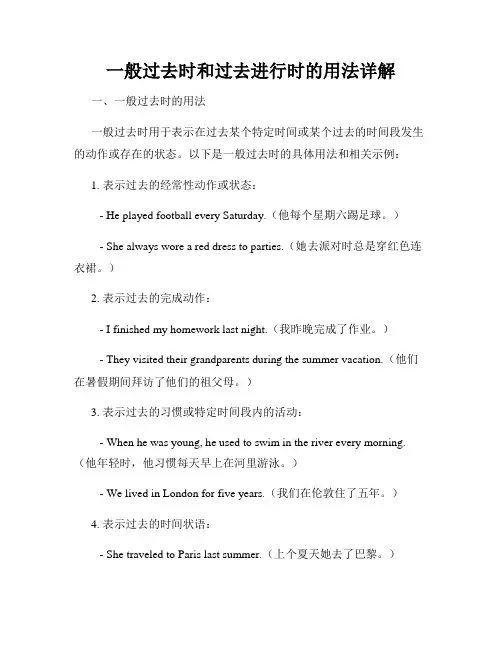
一般过去时和过去进行时的用法详解一、一般过去时的用法一般过去时用于表示在过去某个特定时间或某个过去的时间段发生的动作或存在的状态。
以下是一般过去时的具体用法和相关示例:1. 表示过去的经常性动作或状态:- He played football every Saturday.(他每个星期六踢足球。
)- She always wore a red dress to parties.(她去派对时总是穿红色连衣裙。
)2. 表示过去的完成动作:- I finished my homework last night.(我昨晚完成了作业。
)- They visited their grandparents during the summer vacation.(他们在暑假期间拜访了他们的祖父母。
)3. 表示过去的习惯或特定时间段内的活动:- When he was young, he used to swim in the river every morning.(他年轻时,他习惯每天早上在河里游泳。
)- We lived in London for five years.(我们在伦敦住了五年。
)4. 表示过去的时间状语:- She traveled to Paris last summer.(上个夏天她去了巴黎。
)- He studied French when he was in college.(他上大学时学过法语。
)二、过去进行时的用法过去进行时用于表示过去某个时间点或某个时间段内正在进行的动作。
以下是过去进行时的具体用法和相关示例:1. 表示过去某一时刻正在进行的动作:- They were having dinner at 7 pm yesterday.(昨天晚上7点他们正在吃晚饭。
)- I was watching TV when the phone rang.(电话响的时候我正在看电视。
)2. 表示过去某个时间段内正在进行的动作:- She was studying all day yesterday.(昨天她一整天都在学习。
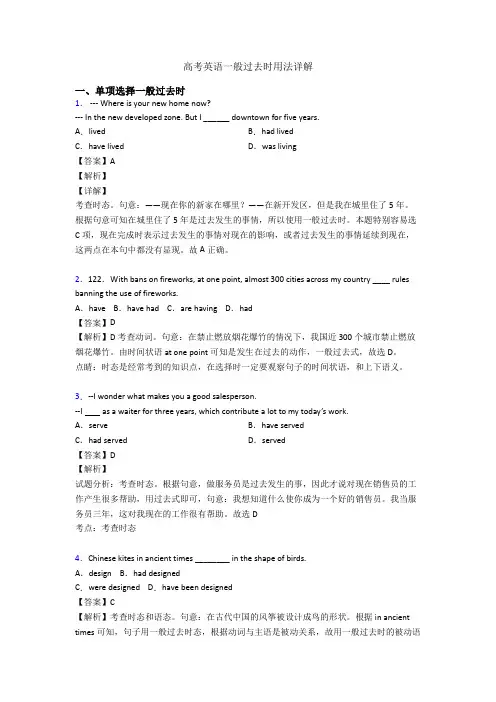
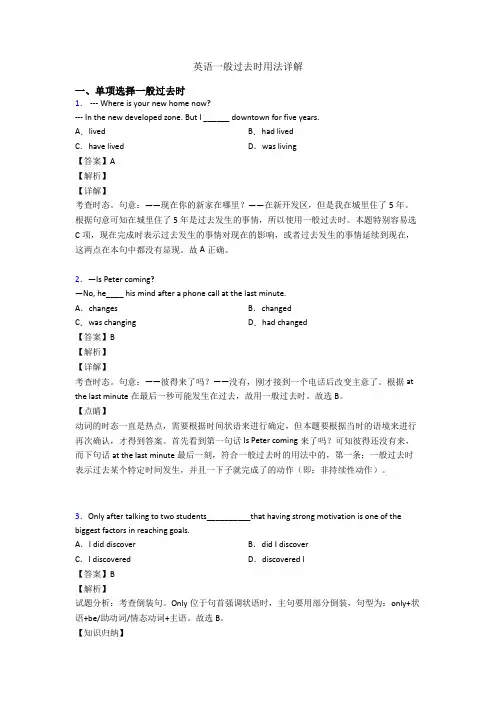
英语一般过去时用法详解一、单项选择一般过去时1. --- Where is your new home now?--- In the new developed zone. But I ______ downtown for five years.A.lived B.had livedC.have lived D.was living【答案】A【解析】【详解】考查时态。
句意:——现在你的新家在哪里?——在新开发区,但是我在城里住了5年。
根据句意可知在城里住了5年是过去发生的事情,所以使用一般过去时。
本题特别容易选C项,现在完成时表示过去发生的事情对现在的影响,或者过去发生的事情延续到现在,这两点在本句中都没有显现。
故A正确。
2.—Is Peter coming?—No, he____ his mind after a phone call at the last minute.A.changes B.changedC.was changing D.had changed【答案】B【解析】【详解】考查时态。
句意:——彼得来了吗?——没有,刚才接到一个电话后改变主意了。
根据at the last minute在最后一秒可能发生在过去,故用一般过去时。
故选B。
【点睛】动词的时态一直是热点,需要根据时间状语来进行确定,但本题要根据当时的语境来进行再次确认,才得到答案。
首先看到第一句话Is Peter coming来了吗?可知彼得还没有来,而下句话at the last minute最后一刻,符合一般过去时的用法中的,第一条:一般过去时表示过去某个特定时间发生,并且一下子就完成了的动作(即:非持续性动作)。
3.Only after talking to two students__________that having strong motivation is one of the biggest factors in reaching goals.A.I did discover B.did I discoverC.I discovered D.discovered I【答案】B【解析】试题分析:考查倒装句。
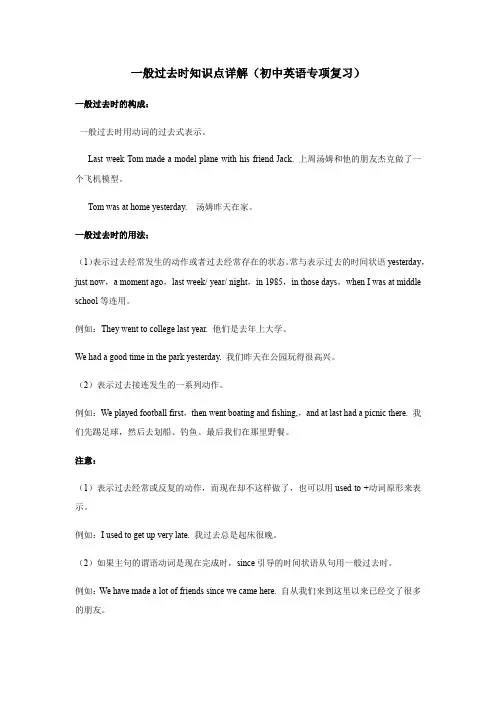
一般过去时知识点详解(初中英语专项复习)一般过去时的构成:一般过去时用动词的过去式表示。
Last week Tom made a model plane with his friend Jack. 上周汤姆和他的朋友杰克做了一个飞机模型。
Tom was at home yesterday. 汤姆昨天在家。
一般过去时的用法:(1)表示过去经常发生的动作或者过去经常存在的状态。
常与表示过去的时间状语yesterday,just now,a moment ago,last week/ year/ night,in 1985,in those days,when I was at middle school等连用。
例如:They went to college last year. 他们是去年上大学。
We had a good time in the park yesterday. 我们昨天在公园玩得很高兴。
(2)表示过去接连发生的一系列动作。
例如:We played football first,then went boating and fishing,,and at last had a picnic there. 我们先踢足球,然后去划船、钓鱼。
最后我们在那里野餐。
注意:(1)表示过去经常或反复的动作,而现在却不这样做了,也可以用used to +动词原形来表示。
例如:I used to get up very late. 我过去总是起床很晚。
(2)如果主句的谓语动词是现在完成时,since引导的时间状语从句用一般过去时。
例如:We have made a lot of friends since we came here. 自从我们来到这里以来已经交了很多的朋友。
(3)谈论某人的出生日期经常用一般过去时。
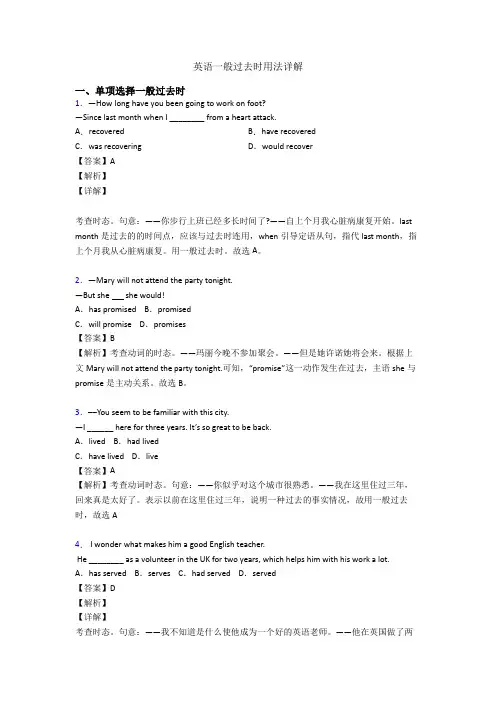
英语一般过去时用法详解一、单项选择一般过去时1.—How long have you been going to work on foot?—Since last month when I ________ from a heart attack.A.recovered B.have recoveredC.was recovering D.would recover【答案】A【解析】【详解】考查时态。
句意:——你步行上班已经多长时间了?——自上个月我心脏病康复开始。
last month是过去的的时间点,应该与过去时连用,when引导定语从句,指代last month,指上个月我从心脏病康复。
用一般过去时。
故选A。
2.—Mary will not attend the party tonight.—But she she would!A.has promised B.promisedC.will promise D.promises【答案】B【解析】考查动词的时态。
——玛丽今晚不参加聚会。
——但是她许诺她将会来。
根据上文Mary will not attend the party tonight.可知,“promise”这一动作发生在过去,主语she与promise是主动关系。
故选B。
3.––You seem to be familiar with this city.—I ______ here for three years. It’s so great to be back.A.lived B.had livedC.have lived D.live【答案】A【解析】考查动词时态。
句意:——你似乎对这个城市很熟悉。
——我在这里住过三年,回来真是太好了。
表示以前在这里住过三年,说明一种过去的事实情况,故用一般过去时,故选A4. I wonder what makes him a good English teacher.He ________ as a volunteer in the UK for two years, which helps him with his work a lot. A.has served B.serves C.had served D.served【答案】D【解析】【详解】考查时态。
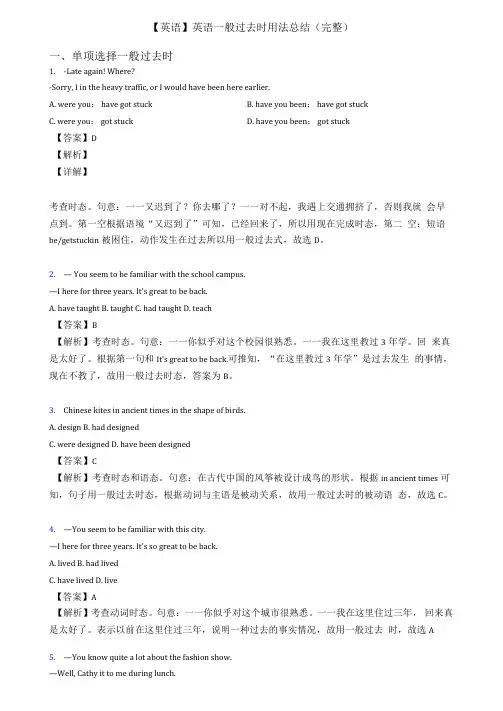
【英语】英语一般过去时用法总结(完整)一、单项选择一般过去时1.-Late again! Where?-Sorry, I in the heavy traffic, or I would have been here earlier.A. were you: have got stuckB. have you been; have got stuckC. were you; got stuckD. have you been; got stuck【答案】D【解析】【详解】考查时态。
句意:一一又迟到了?你去哪了?一一对不起,我遇上交通拥挤了,否则我就会早点到。
第一空根据语境“又迟到了”可知,已经回来了,所以用现在完成时态,第二空:短语be/getstuckin被困住,动作发生在过去所以用一般过去式,故选D。
2.— You seem to be familiar with the school campus.—I here for three years. It's great to be back.A. have taughtB. taughtC. had taughtD. teach【答案】B【解析】考查时态。
句意:一一你似乎对这个校园很熟悉。
一一我在这里教过3年学。
回来真是太好了。
根据第一句和It's great to be back.可推知,“在这里教过3年学”是过去发生的事情,现在不教了,故用一般过去时态,答案为B。
3.Chinese kites in ancient times in the shape of birds.A. designB. had designedC. were designedD. have been designed【答案】C【解析】考查时态和语态。
句意:在古代中国的风筝被设计成鸟的形状。
根据in ancient times可知,句子用一般过去时态,根据动词与主语是被动关系,故用一般过去时的被动语态,故选C。
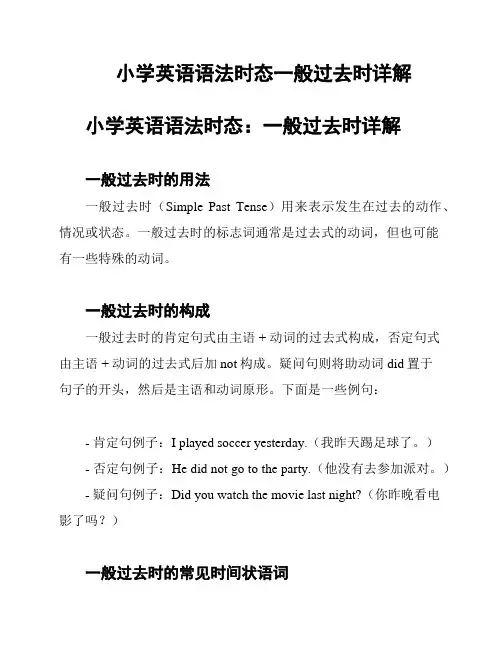
小学英语语法时态一般过去时详解小学英语语法时态:一般过去时详解一般过去时的用法一般过去时(Simple Past Tense)用来表示发生在过去的动作、情况或状态。
一般过去时的标志词通常是过去式的动词,但也可能有一些特殊的动词。
一般过去时的构成一般过去时的肯定句式由主语 + 动词的过去式构成,否定句式由主语 + 动词的过去式后加not构成。
疑问句则将助动词did置于句子的开头,然后是主语和动词原形。
下面是一些例句:- 肯定句例子:I played soccer yesterday.(我昨天踢足球了。
)- 否定句例子:He did not go to the party.(他没有去参加派对。
)- 疑问句例子:Did you watch the movie last night?(你昨晚看电影了吗?)一般过去时的常见时间状语词一般过去时通常会和一些时间状语词一起使用,以明确动作发生的具体时间。
以下是一些常见的时间状语词:- yesterday(昨天)- last week(上周)- two days ago(两天前)- in 1998(在1998年)一般过去时的特殊用法一般过去时有一些特殊的用法需要注意:1. 表示过去经常性的动作或惯。
例如:When I was young, I played soccer every day.(当我年轻时,我每天都踢足球。
)2. 表示过去事实或真理。
例如:The earth revolved around the sun.(地球绕太阳转。
)总结一般过去时用来描述发生在过去的动作、情况或状态。
它的构成简单,使用过去式的动词作为标志词。
通过加入时间状语词,可以更明确地指出动作发生的具体时间。
同时,一般过去时还有一些特殊的用法,需要灵活运用。
>注意:本文内容仅供参考,具体使用时请根据实际情况和教材要求进行调整。
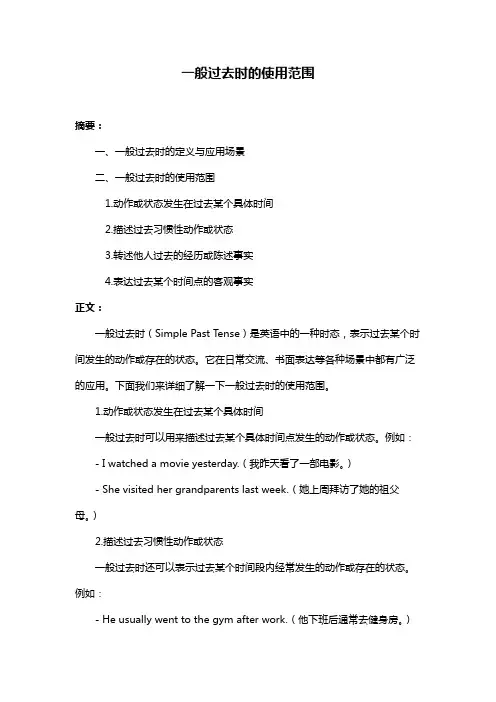
一般过去时的使用范围摘要:一、一般过去时的定义与应用场景二、一般过去时的使用范围1.动作或状态发生在过去某个具体时间2.描述过去习惯性动作或状态3.转述他人过去的经历或陈述事实4.表达过去某个时间点的客观事实正文:一般过去时(Simple Past Tense)是英语中的一种时态,表示过去某个时间发生的动作或存在的状态。
它在日常交流、书面表达等各种场景中都有广泛的应用。
下面我们来详细了解一下一般过去时的使用范围。
1.动作或状态发生在过去某个具体时间一般过去时可以用来描述过去某个具体时间点发生的动作或状态。
例如:- I watched a movie yesterday.(我昨天看了一部电影。
)- She visited her grandparents last week.(她上周拜访了她的祖父母。
)2.描述过去习惯性动作或状态一般过去时还可以表示过去某个时间段内经常发生的动作或存在的状态。
例如:- He usually went to the gym after work.(他下班后通常去健身房。
)- She was a good student in high school.(她高中时是个优秀的学生。
)3.转述他人过去的经历或陈述事实在转述他人过去的经历或陈述事实时,我们也可以使用一般过去时。
例如:- He said he had visited many countries.(他说他去过很多国家。
)- She explained that she had studied English for five years.(她解释说她学英语已经五年了。
)4.表达过去某个时间点的客观事实一般过去时还可以用来表达过去某个时间点的客观事实。
例如:- The sun rose in the east.(太阳从东方升起。
)- The plane landed safely at the airport.(飞机安全降落在机场。
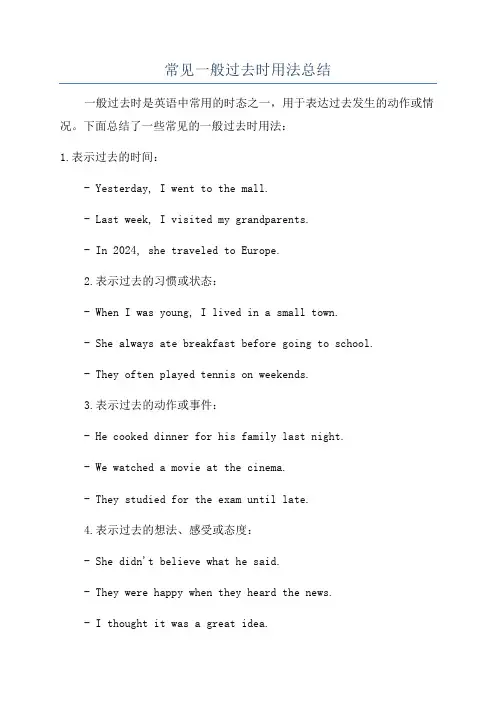
常见一般过去时用法总结一般过去时是英语中常用的时态之一,用于表达过去发生的动作或情况。
下面总结了一些常见的一般过去时用法:1.表示过去的时间:- Yesterday, I went to the mall.- Last week, I visited my grandparents.- In 2024, she traveled to Europe.2.表示过去的习惯或状态:- When I was young, I lived in a small town.- She always ate breakfast before going to school.- They often played tennis on weekends.3.表示过去的动作或事件:- He cooked dinner for his family last night.- We watched a movie at the cinema.- They studied for the exam until late.4.表示过去的想法、感受或态度:- She didn't believe what he said.- They were happy when they heard the news.- I thought it was a great idea.5.表示过去的条件或假设:- If I had known, I would have helped him.- I wish I had studied harder.- She would have won the race if she had trained more.6.表示过去经常性的动作或习惯:- Every day, she walked her dog in the park.- They always went to the beach during summer vacations.- He often played chess with his friends.7.表示过去的计划或安排:- We were supposed to meet at 5 o'clock, but he didn't show up.- They had booked tickets for the concert, but it was canceled.8.表示过去的建议或请求:- He suggested going to the new restaurant for dinner.- I asked him to help me with my homework.- She told me to be careful.9.表示过去的能力或可能性:- She could run very fast when she was younger.- He was able to speak three languages.- They might have gone to the party, but I'm not sure.10.表示过去的频率或数量:- He visited his grandparents twice a month.总结:一般过去时常用于描述过去发生的动作、状态、习惯和想法等。
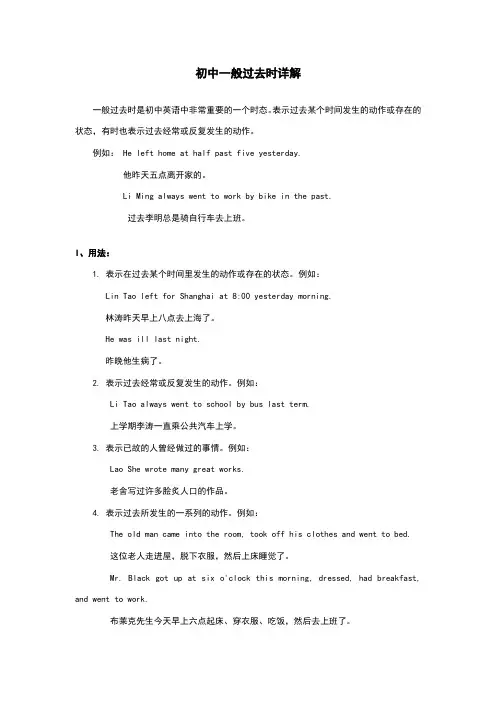
初中一般过去时详解一般过去时是初中英语中非常重要的一个时态。
表示过去某个时间发生的动作或存在的状态,有时也表示过去经常或反复发生的动作。
例如: He left home at half past five yesterday.他昨天五点离开家的。
Li Ming always went to work by bike in the past.过去李明总是骑自行车去上班。
I、用法:1. 表示在过去某个时间里发生的动作或存在的状态。
例如:Lin Tao left for Shanghai at 8:00 yesterday morning.林涛昨天早上八点去上海了。
He was ill last night.昨晚他生病了。
2. 表示过去经常或反复发生的动作。
例如:Li Tao always went to school by bus last term.上学期李涛一直乘公共汽车上学。
3. 表示已故的人曾经做过的事情。
例如:Lao She wrote many great works.老舍写过许多脍炙人口的作品。
4. 表示过去所发生的一系列的动作。
例如:The old man came into the room, took off his clothes and went to bed.这位老人走进屋,脱下衣服,然后上床睡觉了。
Mr. Black got up at six o'clock this morning, dressed, had breakfast, and went to work.布莱克先生今天早上六点起床、穿衣服、吃饭,然后去上班了。
II、一般过去时如何识别?每个时态,都会有其独特的标志性词语(主要是时间状语)。
可以称其为“标志词”。
通常来讲,一般过去时常见的标志词有:1. yesterday, the day before yesterday.2. last week / year / month / term…(简称last系列)3. two hours ago, three years ago, a moment ago…(简称ago系列)4. in / on + 过去的年/月/日,如 in 1999, in April, 20055. just now, once upon a time, one day…III、分类:1. 含有be动词的一般过去时:系动词be的过去式有两种形式:was和were。
The Old CatAn old woman had a cat.The cat was very old; she could not run quickly,and she could not bite,because she was so old.One day the old cat saw a mouse; she jumped and caught the mouse.But she could not bite it; so the mouse got out of her mouth and ran away,because the cat could not bite it.Then the old woman became very angry because the cat had not killed the mouse.She began to hit the cat.The cat said,"Do not hit your old servant.I have worked for you for many years,and I would work for you still,but I am too old.Do not be unkind to the old,but remember what good work the old did when they were young."【译文】老猫一位老妇有只猫,这只猫很老,它跑不快了,也咬不了东西,因为它年纪太大了.一天,老猫发现一只老鼠,它跳过去抓这只老鼠,然而,它咬不住这只老鼠.因此,老鼠从它的嘴边溜掉了,因为老猫咬不了它.于是,老妇很生气,因为老猫没有把老鼠咬死.她开始打这只猫,猫说:“不要打你的老仆人,我已经为你服务了很多年,而且还愿意为你效劳,但是,我实在太老了,对年纪大的不要这么无情,要记住老年人在年青时所做过的有益的事情.”英语动词时态详解:一般过去时一、一般过去时的定义一般过去时表示过去某一时候或某一段时间所发生了的事情或存在的状态。
一般过去时变化规则一般过去时是英语中最常用的时态之一,表示过去发生的动作或状态。
在构成一般过去时的句子时,动词需要进行相应的变化。
下面将介绍一般过去时的变化规则。
一般规则动词的变化在一般过去时中,一般规则动词的变化非常简单,只需在动词原形后加上-ed。
例如:- work → worked- play → played- walk → walked这些动词在一般过去时中都只需加上-ed就可以了。
但是也有一些特殊情况需要注意。
以不规则动词的变化不规则动词在一般过去时中的变化不遵循一般规则,需要进行特殊的变化。
例如:- go → went- eat → ate- see → saw这些动词在一般过去时中都有自己特定的过去式形式,需要进行记忆和熟练掌握。
动词变化的特殊情况在一般过去时中,有一些动词的变化需要注意特殊情况。
例如以不发音的-e结尾的动词,在变化时需要去掉这个-e再加上-ed。
例如:- dance → danced- love → loved还有一些以辅音字母+y结尾的动词,变化时需要将y变为i再加上-ed。
例如:- study → studied- carry → carried另外,还有一些动词在变化时需要双写末尾的辅音字母再加上-ed。
例如:- stop → stopped- plan → planned这些都是在一般过去时中需要注意的特殊情况,需要进行细致的学习和掌握。
总结一般过去时是英语中最常用的时态之一,掌握好一般过去时的变化规则对于学习英语非常重要。
一般规则动词只需在原形后加上-ed,不规则动词需要进行特殊的变化,而一些特殊情况也需要特别注意。
通过不断的练习和记忆,相信大家一定可以掌握好一般过去时的变化规则,从而在英语学习中更加游刃有余。
初中一般过去时详解一般过去时是初中英语中非常重要的一个时态。
表示过去某个时间发生的动作或存在的状态,有时也表示过去经常或反复发生的动作。
例如:He left home at half past five yesterday.他昨天五点离开家的。
Li Ming always went to work by bike in the past.过去李明总是骑自行车去上班。
I、用法:1. 表示在过去某个时间里发生的动作或存在的状态。
例如:Lin Tao left for Shanghai at 8:00 yesterday morning.林涛昨天早上八点去上海了。
He was ill last night.昨晚他生病了。
2. 表示过去经常或反复发生的动作。
例如:Li Tao always went to school by bus last term.上学期李涛一直乘公共汽车上学。
3. 表示已故的人曾经做过的事情。
例如:Lao She wrote many great works.老舍写过许多脍炙人口的作品。
4. 表示过去所发生的一系列的动作。
例如:The old man came into the room, took off his clothes and went to bed.这位老人走进屋,脱下衣服,然后上床睡觉了。
Mr. Black got up at six o'clock this morning, dressed, had breakfast, and went to work.布莱克先生今天早上六点起床、穿衣服、吃饭,然后去上班了。
II、一般过去时如何识别?每个时态,都会有其独特的标志性词语(主要是时间状语)。
可以称其为“标志词”。
通常来讲,一般过去时常见的标志词有:1. yesterday, the day before yesterday.2. last week / year / month / term…(简称last系列)3. two hours ago, three years ago, a moment ago…(简称ago系列)4. in / on + 过去的年/月/日,如in 1999, in April, 20055. just now, once upon a time, one day…III、分类:1. 含有be动词的一般过去时:系动词be的过去式有两种形式:was和were。
英语动词时态及用法详解英语动词时态是英语语法中的重要组成部分,它能够帮助我们准确地表达动作发生的时间和状态。
在这篇文章中,我们将详细探讨英语中常见的动词时态及其用法。
一、一般现在时一般现在时表示经常发生的动作、习惯性的行为、客观真理或普遍存在的情况。
其构成是主语+动词原形(当主语是第三人称单数时,动词要加“s”或“es”)。
例如:“I go to school every day”(我每天上学。
)“He likes playing football”(他喜欢踢足球。
)一般现在时常用于以下情况:1、表示日常习惯和规律,如“He gets up early every morning”(他每天早上都早起。
)2、表示客观事实和真理,例如“The earth moves around the sun”(地球绕着太阳转。
)3、表示永恒的状态,“Water boils at 100 degrees Celsius”(水在 100 摄氏度沸腾。
)二、一般过去时一般过去时表示过去某个时间发生的动作或存在的状态。
其构成是主语+动词的过去式。
比如:“I saw a movie yesterday”(我昨天看了一场电影。
)“She was happy last week”(她上周很开心。
)一般过去时的使用场景通常有:1、描述过去发生的一次性动作,“I met her at the party last night”(昨晚在派对上我遇见了她。
)2、讲述过去的习惯或状态,“When I was a child, I often played in the park”(当我还是个孩子的时候,我经常在公园玩。
)三、一般将来时一般将来时表示将来要发生的动作或存在的状态。
常见的构成方式有“will +动词原形”和“be going to +动词原形”。
像:“I will visit my grandparents next weekend”(下个周末我将去看望我的祖父母。
一般过去时一.定义一般过去时用来表示过去某一时间内发生的动作或存在的状态以及过去习惯性、反复性的动作;谓语动词要用动词的过去式,常和表示过去的时间状语连用,如yesterday昨天、last night昨晚、last week上周、last year去年,等;二.动词过去式的变化1. be词的过去式:amis的过去式为was;are的过去式为were注:在这种构成中,be动词有人称和数的变化,即要根据主语选用was/were;Be动词分为单数和复数,主语为单数用was, 主语为复数用were2. 规则动词的过去式a. 一般情况下,在动词原形后面加-ed;look→looked play→played start→startedb. 以不发音e结尾的动词,在词尾直接加-d;live→lived use→usedc. 以“辅音字母+ y”结尾的动词,先将y 改为i ,再加–ed;study→studied try→tried fly→fliedd.以重读闭音节即辅音+元音+辅音或r音节结尾,末尾只有一个辅音字母的动词,要先双写这个辅音字母后,再加–ed; stop→stopped plan→planned prefer→preferred2. 不规则动词的过去式是需要记忆的,详见书上的不规则动词表三.一般过去时的基本用法1. 表示过去某个特定时间发生的动作或存在的状态;eg. He suddenly fell ill last night. 他昨晚突然病倒了2. 表示过去的习惯性或经常发生的动作;eg. She went to the cinema once a month when she was at school. 她上学时每个月去看一场电影When I was in the countryside, I often walked by the riverside.我在乡下时经常在河边散步;3. 一般过去时表示过去经常或反复发生的动作,常和often经常, always总是,once a week一周一次,等表示频度的时间状语连用;eg. She went to the cinema once a month when she was at school. 她上学时每个月去看一场电影4.叙述过去连续发生的一件件事;eg. She got up early, fetched water, cleaned the room and then went out for a walk. 她早早起床,提水,打扫房间然后出去散步;四.一般过去时的判断标志词yesterday , the day before yesterday , last + 时间, this morning时间+ ago , just now , a moment ago , in + 过去的时间五.一般过去时的句型转换1. 谓语动词为be动词时陈述句式:主语+ bewas , were + 其它.否定句式:主语+ bewas , were + not + 其它.一般疑问句:Bewas , were + 主语+ 其它特殊疑问句:特殊疑问词+be过去式+主语+其他eg. 陈述句:He was a teacher ten years ago.否定句式:He wasn’t a teacher ten years ago.一般疑问句:Was he a teacher ten years ago-特殊疑问句:What was he ten years ago2. 谓语动词为实意动词时陈述句式:主语+ 动词过去式+ 其它否定句式:主语+ didn’t + 动词原形+ 其它did not = didn’t一般疑问句:Did + 主语+ 动词原形+ 其它do , does的过去时均为did特殊疑问句:特殊疑问词+do/does过去式+主语+动词原形+其他eg. 陈述句式:He lived in Bengbu last year.否定句式:He didn’t live in Bengbu last year.一般疑问句:Did he live in Bengbu last year特殊疑问句:Where did he live last year3. 谓语动词为情态动词时陈述句式:主语+ 情态动词+ 其它.否定句式:主语+ 情态动词+ not + 其它.一般疑问句:情态动词+ 主语+ 其它特殊疑问句:特殊疑问词+do/does过去式+主语+动词原形+其他eg. 陈述句式:He could swim when he was just a little boy.否定句式:He could’t swim when he was just a little boy.一般疑问句:Could he swim when was just a little boy特殊疑问句:What could he do when he was just a little boy。
英语语法与词汇详解一般过去时一、什么是一般过去时?①表示过去某个时间里发生的动作或状态;(过去习惯性、经常性的动作、行为;过去主语所具备的能力和性格。
)二、一般过去时怎么用?①带有确定的过去时间状语时,需要使用过去时-> 表示过去时间状语的单词有:yesterday[昨天],two days ago[两天前],the other day[前几天],last year[去年],once upon a time[很久以前],just now[刚才],in the old days[过去的日子里],when I was 12 years old[当我12岁时],at + 一个时间点;-> 句子1:Her heart anguished within her when she learned that her husband had fallen in battle before 2020. [得知丈夫2020年前已经阵亡的消息,她内心万分痛苦。
]-> anguished:adj. 极度痛苦的,v. 使极度痛苦(anguish的过去式);-> 句子2:He made a decision just now.[他刚刚作出决定。
]②表示过去连续发生的动作时[注意:这种情况下,往往没有表示过去的时间状语,而通过上下文来表示。
]-> 句子1:The Chinese anticipated the European discovery of gunpowder.[中国人先于欧洲人发现火药。
]-> anticipated:adj. 预期的;期望的;v. 预料(anticipate的过去分词);盼望-> gunpowder:n. 火药;有烟火药-> 句子2:He appealed against the five-year sentence he had been given.[他对被判五年徒刑提出上诉。